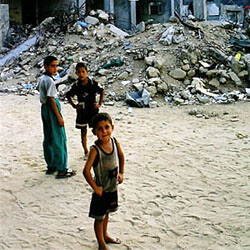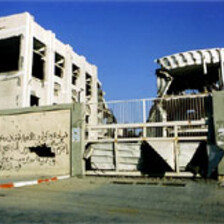Rafah, Gaza Strip 5 November 2002

For the children of Gaza, their playground is the debris left in the wake of Israel’s ethnic cleansing of Palestinians from their homes. (Photo: Sam Costa)
His wife was unable to reach his crying daughter as Apache helicopters fired missiles behind the house he now stays in. The man says this is to frighten the people. He said that they are terrorized also by “the plane without a driver.” These are the drones that continuously circle camps and cities, sounding like a mosquito that will not leave ones ear. He says, “We are going crazy.”
Since his house was demolished he lived for a few days in his restaurant, but it was shot at so often the family could not stay. Now he sleeps in the kitchen of a friends house with his wife. The children sleep in an office area. His daughter wets her bed every night and most often cannot sleep. This is consistant behavior now in most Palestinian children, according to Palestinian human rights organizations in Rafah and Khan Younis.
The Israeli soldiers continue to shoot into this area of Rafah, Block O, not far from Salahadeen Gate, every night. The houses that still stand are unihabitable. In one night 75 houses were demolished, in another 6, and another 50. According to the Municipality of Rafah, over 50 Palestinians were killed here last week.
The head of the Water Municipality in Rafah tells me that it is ironic that the name of the area means peace. He says it should be changed to war. A pile of gray cement, once a family’s home, sits next to the street. Directly in front is a small white tent. This is where the family now lives. There is no furniture, no clothes, no family pictures. They are all somewhere under the rubble. Each day at least 6 Palestinian homes are demolished, except Saturday which is a holiday for Israelis.
In the Block O area of Rafah, Israeli soldiers in armoured bulldozers, tanks, and cranes, bulldoze homes and dig into the ground. They are buliding a wall, 8 metres high and 10 metres deep, between Rafah Egypt and Rafah Palestine. This area was divided in 1982 based on the Camp David Accords. A small group of international activists stood between Israeli tanks and two Palestinians in straw hats so that the workers could unclog the sewage lines. If it rains again, the area will be flooded.
The cleanest water for the Palestinians in Rafah comes from a well in Tela Sultan, an area in the western part of Rafah, close to the Israeli settlements which take most of the water. The area is unsafe. Israeli soliders shoot at the children who play in the sand. Water that comes from outside is diverted by Israel for its own agriculture in the Negev Desert. The head of the Water Municipality in Rafah says that the severe water shortage is because of Israeli policy. “If they didn’t take our water, there would be enough for us.” The population of Rafah is 130,000.
Permission has been granted to Palestinians by Israel to repair some of the buildings in its airport, destroyed by the Israeli military last year. They will not give permission to rebuild the runway.
At the Tufah checkpoint between Khan Younis camp, where residents are described as “people with nothing left to lose,” and Mawasi, where I am told that “the life is dead,” 300 people waited for the fourth day to pass by heavily armed Israeli soldiers. Some soliders sat in a sniper tower while two others played, running and jumping in the sun. Clearly they were not afraid of the Palestinians carrying heavy bags of rice and hauling water. Soliders sitting in the sniper towers next to the checkpoint spent the afternoon shooting at three buildings, already destroyed. The area was quiet only when the soldiers took their lunch break. I was implored by a small girl, 10 years old with freckles, to squat on the ground in order to avoid being shot.
In the morning the ground flooded with rain while Palestinians had to wait for the checkpoint to go home. The water dried, leaving dust and intense heat while the people continued to wait. Just beyond is the Mediterranean, flanked by palm trees. This is unreachable for Palestinians, even if they eventually make it through the checkpoint. On this day, 10 women in 2 groups of 5, were allowed through. Hundreds, tired, fed-up, afraid, were not allowed to go home again. They had to turn around and leave the area because the Israeli soldiers shoot throughout the night.
Families are harvesting their olives in the interior villages of the Gaza Strip. Any trees near Israeli soldiers and settlements have been demolished.
The dusty streets of Rafah were crowded today with children coming home from school and people going to and from work. Retaining infrastructure is impossible so the streets are just dirt, there is no where to put the garbage, and most of the water is undrinkable for Palestinians. They are living their lives while being forced into a smaller space each day, squeezed by Israel until there is no where left to go.
Kristen Ess is a political activist and freelance journalist from New York City, who has lived in the West Bank and Gaza since March 2002, where she does solidarity work and reports for Free Speech Radio news and Left Turn magazine.


